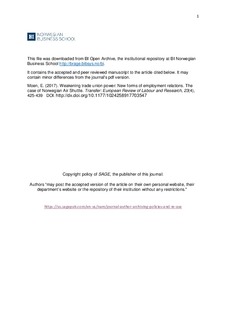Weakening trade union power: New forms of employment relations. The case of the Norwegian Air Shuttle
Journal article, Peer reviewed
Accepted version
Permanent lenke
http://hdl.handle.net/11250/2490662Utgivelsesdato
2017Metadata
Vis full innførselSamlinger
- Publikasjoner fra CRIStin - BI [1015]
- Scientific articles [2181]
Originalversjon
Transfer: European Review of Labour and Research. 2017, 23 (4), 425-439. 10.1177/1024258917703547Sammendrag
For the past two decades – and in particular after the 2008 crisis – atypical employment has expanded across Europe. The crisis led to increased demand for more flexible labour markets, and thus atypical employment became an important tool for employment, competitiveness and economic growth. However, recent research reveals that employers are using atypical employment not just to compensate for unstable markets, but also as an opportunity to cut costs by bypassing collective agreements and to discipline workers, works councils and unions. The case study presented in this article corroborates these findings, arguing that employers – in addition to reducing costs – are making use of atypical employment to weaken organised labour as a goal in its own right. Whether such behaviour forms part of a larger drive to resist unions needs to be further researched. In any event, atypical employment represents an increasing challenge to trade unions across Europe.
Beskrivelse
The accepted and peer reviewed manuscript to the article
